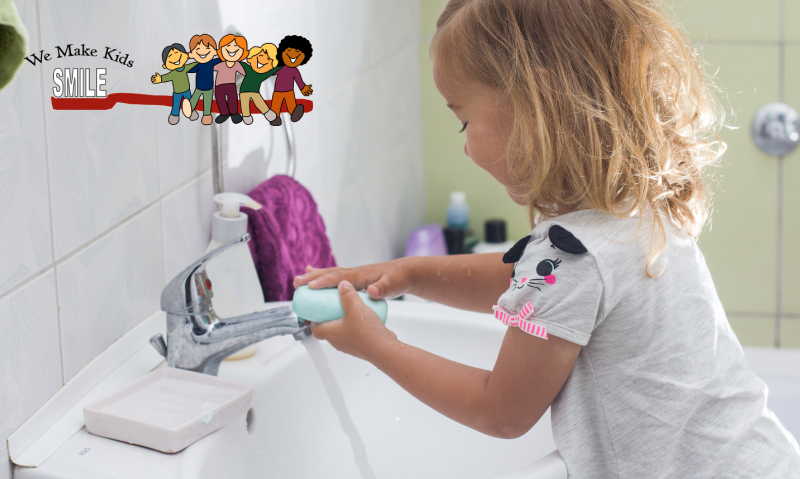Why you should teach your child to wash their hands.
Keeping your hands clean is one of the most effective (and easiest) ways to stay healthy and prevent the spread of diseases. When you follow proper handwashing guidelines yourself—and teach your children the same—you’re reducing the number of trips you’ll make to the pediatrician because of flu or stomach bugs. This means you’ll take less time away from work and the kids won’t miss out on school or daycare, giving everyone more time for fun family-bonding activities.
 The Principles of Handwashing
The Principles of Handwashing
In order to make handwashing a habit, it’s important to establish rituals for when this activity should take place. Generally speaking, these are the times when it’s most important to wash your hands:
- When they are visibly dirty.
- Before eating or preparing food.
- After using the bathroom.
- Before inserting contact lenses.
- After taking out the trash can.
- After touching pets.
- After blowing your nose, sneezing, coughing, or wiping your mouth.
- When coming home after being outside.
Proper Handwashing Technique
A good handwashing technique starts with you wetting your hands. Use soap to create a good lather and scrub every surface of your hand—paying extra attention to areas underneath your fingernails where most germs like to hide. Thoroughly rinse your hands with running water to make sure you don’t leave any suds on your skin that might cause irritation later. Dry your hands using a clean towel to complete the handwashing session.
On the surface, this handwashing technique sounds easy, but young children may find it a bit tedious. You’ll have an easier time cultivating a handwashing culture in your child if you turn it into a fun activity. And it all starts by using the right tools—choose a soap shaped like their favorite toy or movie/book character. If it also produces lots of foam and smells really nice, even better, it will make each of the 20 seconds it takes to hum the “Happy Birthday” song twice much more enjoyable.
Teaching Hand Hygiene to Children
To cultivate a handwashing culture that will last a lifetime, your kids need to understand why it’s important, which means going back to the basics—what are germs? Saying that these are microscopic bacteria that cause diseases may not be something your four-year-old child can understand, so let’s introduce the villain, Mr. Germ, instead. Explain that although you can’t see these tiny creatures, they live on every surface, and are always looking for ways to get into our bodies. Let them know how handwashing helps the good guys in our bodies stay safe so your little one can keep doing fun things, like going to the park. Such an imaginative approach to teaching your child about germs has a better chance of leaving a long-lasting impression and (hopefully) you won’t have to use the dreaded phrase “because I said so” each time you ask them to wash their hands.
We Make Kids Smile is your partner in your child’s health.
At We Make Kids Smile, we understand the importance of maintaining strict hygiene practices in our offices. And we also know that your child’s oral health is another area that should be safeguarded from Mr. Germ and his friends. If your child is due for an oral health checkup, feel free to get in touch or request an appointment via our website.
